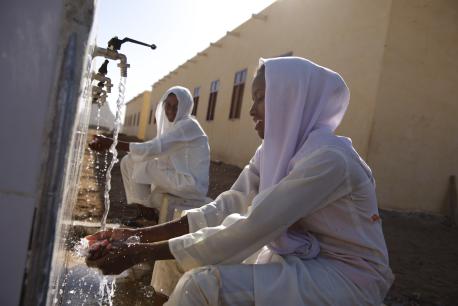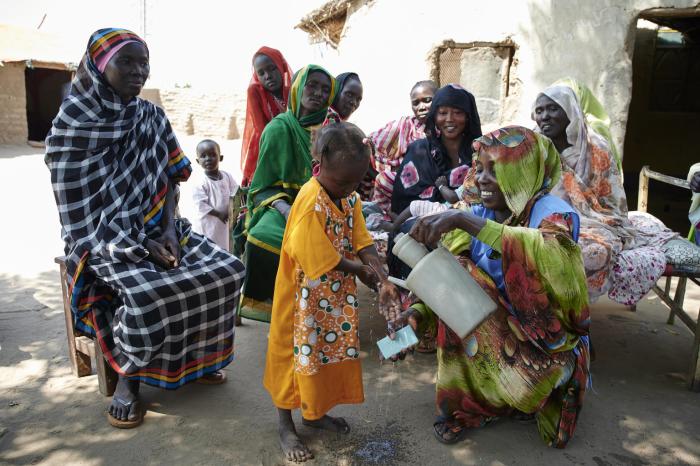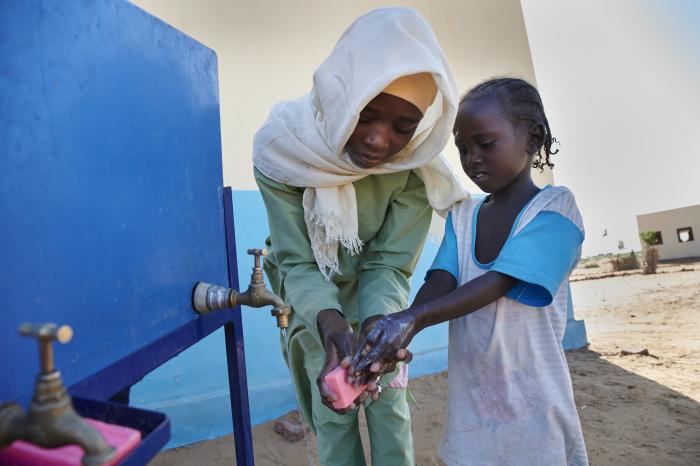
Making Lasting Change for Children and Communities in Sudan
In 2020, the Sudanese American Medical Association (SAMA) and UNICEF USA launched a strategic partnership to amplify and raise funds for UNICEF’s Water, Sanitation and Hygiene (WASH) programs in Sudan. With support from SAMA’s membership and affiliated organizations like Sudan NextGen, these efforts will focus on the linkage between WASH efforts and combatting the spread of COVID-19.
SAMA is a non-profit, non-political, educational and humanitarian organization whose members are medical professionals of Sudanese descent. Its membership is committed to a sustained contribution by the Sudanese diaspora in the promotion of the health and wellbeing of communities throughout their ancestral country of Sudan.
This year, an estimated 9.3 million people – including 5.3 million children – are in need of humanitarian assistance in Sudan, reflecting a sharp increase from 2019. Children, families and communities in Sudan face major challenges such as protracted conflict and displacement, natural disasters, along with emergency-level malnutrition and food insecurity. Recent data show that more than 1.8 million internally displaced persons (IDPs) who have fled violence and conflict are residing in Sudan.

During a household visit, a community health worker uses a young girl child to demonstrate how to wash hands using soap and water in a village in Gennis in Roseires locality of Blue Nile State in Sudan. © UNICEF/UNI236387/Noorani
Together, SAMA and UNICEF USA will boost essential outreach to Sudan’s most vulnerable children and communities through lifesaving WASH and disease prevention services which include:
- Helping families access sufficient safe water for drinking, cooking and personal hygiene
- Building adequate sanitation facilities and environments free of open defecation
- Reaching communities with messages about appropriate hygiene and disease prevention practices
- Supplying medical professionals and families with personal protective equipment, sanitation products and other tools to prevent the spread of disease
Most importantly, only a third of households have access to proper sanitation and about 68 percent have access to drinking water sources. These gaps negatively impact children’s attendance and enrollment in school, especially girls. Two million (or almost half) of the children in Sudan suffer from acute malnutrition, 50 percent of whom suffer from repeated diarrhea or worm infections.

An older girl child shows how to properly wash hands using water and soup to a younger student from kinder garten (KG) at Ban Jadid Primary School in the city of El-Fasher, the capital of the state of North Darfur, Sudan. © UNICEF/UNI233850/Noorani
Furthermore, with nearly a third of households (over 10 million people) practicing open defecation, Sudan has the highest prevalence of open defecation in the Middle East and North Africa region, posing grave public health risks to transmission of diseases such as cholera, diarrhea, dysentery, hepatitis A, typhoid and polio.
To tackle these challenges, UNICEF Sudan and partners are making water and sanitation services accessible to the most vulnerable Sudanese children and their communities (learn more by watching our most recent Facebook Live event).
With the support of SAMA and other Sudanese Diaspora organizations, UNICEF will be able to enhance its work with the Government of Sudan and boost essential outreach through lifesaving WASH and disease prevention services. The COVID-19 pandemic has triggered an unprecedented global health and humanitarian crisis. SAMA’s decision to help UNICEF USA meet the goals of the UNICEF Sudan Country Office is symbolic of the potential and power of Diaspora communities worldwide in maintaining significant ties with their countries of origin.
If you would like to learn more about partnering with UNICEF USA, please contact:
Anne-Marea Griffin
Senior Director of Diaspora and Multicultural Partnerships, UNICEF USA
amgriffin@unicefusa.org
212-922-2628
Top photo: Using soap, girls wash their hands from a water point in a Child-friendly School called Zahra Basic School, in Moosa village, on the outskirts of the city of Kasala in Eastern Sudan. UNICEF supports this school with technical and financial assistance for construction, water and sanitation facilities, furniture, education supplies, textbooks and teacher’s training.
© UNICEF/UNI166353/Noorani
HOW TO HELP
There are many ways to make a difference
War, famine, poverty, natural disasters — threats to the world's children keep coming. But UNICEF won't stop working to keep children healthy and safe.
UNICEF works in over 190 countries and territories — more places than any other children's organization. UNICEF has the world's largest humanitarian warehouse and, when disaster strikes, can get supplies almost anywhere within 72 hours. Constantly innovating, always advocating for a better world for children, UNICEF works to ensure that every child can grow up healthy, educated, protected and respected.
Would you like to help give all children the opportunity to reach their full potential? There are many ways to get involved.





